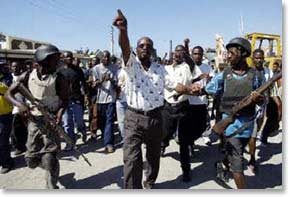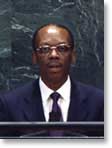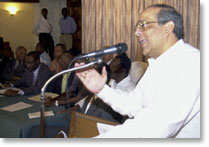- Haiti’s Lawyer: U.S. Is Arming Anti-Aristide Paramilitaries (Democracy Now)
- Haitian President accepts int’l peace plan (XINHUA, 02/22/2004)
- Haiti at brink again – U.S. owes help (FCN, 02/16/2004)
- How the U.S. impoverished Haiti (FCN, 09/10/2003)

WASHINGTON (FinalCall.com) – As the government of the second oldest independent country in the Western Hemisphere spins out of control and toward a bloody civil war or a coup d’etat, Haitian government officials, as well as members of the U.S. Congressional Black Caucus (CBC), see the not-so-hidden hand of the United States government pulling the strings, with a U.S. citizen openly leading the opposition.
“I am calling upon the U.S. government to launch an investigation into the legality of Mr. (Andre) Apaid’s continuing leadership in a foreign political movement, especially one that calls for the violent overthrow of a sovereign government,” Ira Kurzban, General Counsel for the Government of Haiti in the U.S., told a press conference in Port au Prince, his country’s capital city on Feb. 14.

Mr. Apaid is a leader of the Group of 184 which has rejected calls for talks with President Jean-Bertrand Aristide’s government to settle the crisis that has cost the lives of more than 50 people since daily street protests began in earnest this year. Mr. Apaid, born in New York City in 1952, reportedly remains a U.S. citizen. If so, his participation in the anti-government activity in Haiti would be a violation of the Neutrality Act, according to Mr. Kurzban.

Members of armed anti-government groups hoping to topple Mr. Aristide continued hit-and-run attacks throughout the country, especially in northern towns. Rebels maintained control in several towns, as aid agencies increased their warnings of a growing food and medical crisis in the impoverished country of eight million people.
Meanwhile, moderate civilian opponents to the government have been prevented from holding peaceful protests by Aristide supporters who have stoned marchers and erected burning barricades to block proposed demonstration routes in the capital.
“I challenge the Department of State to find out about this man (Mr. Apaid),” Congressional Black Caucus member Maxine Waters (D-Calif.) told reporters on Capitol Hill Feb. 11. “Why do we have someone in Haiti that holds an American passport, owning factories in Haiti, triggering a coup d’etat, and leading the so-called opposition to a democratically elected president?
“Andre Apaid is ferociously adamant about forcing Jean-Bertrand Aristide, the first democratically-elected president in the history of Haiti, out of office,” Rep. Waters said, just two days after returning from her second visit to the country this year.
Despite official assurances that the U.S., Canada and other Caribbean countries are against forcing Mr. Aristide from office before his term is scheduled to end in Feb. 2006, the U.S. government may be “winking and nodding” signals to the opposition to continue its efforts to overthrow the government, she said.
“We will accept no outcome that in any way illegally removes the elected president of Haiti,” Secretary of State Colin Powell told reporters Feb. 13 after meeting with his counterparts from Canada and the 15-nation Caribbean community CARICOM.
“What we need from Aristide now is action and not only words and expressions of support,” Mr. Powell added. Mr. Aristide, Sec. Powell continued, must “reach out to the opposition to make sure that thugs are not allowed to break up peaceful demonstrations.”
But Mr. Powell may be too far removed from the action, insisted Rep. Waters. “I talk to him on the telephone. God bless him,” said Ms. Waters. “He’s up here and the real policy is being developed up under him with (Roger) Noriega.” Mr. Noriega is the Assistant Secretary of State for the Western Hemisphere, and he used to be the chief of staff for former U.S. Senator Jesse Helms (R-S.C.), she said.
“(Mr. Noriega) hates Haiti. He’s been a part of that shadow hand and group in the Congress of the United States that has been working against Haiti for years. Mr. Noriega put out a press statement that blamed the government for the recent crisis that was initiated by the thugs and the opposition up in Gonaives where the so-called rioting is taking place,” Rep. Waters continued.
“The protests he organizes have become increasingly violent. Police officers are confronted, property is damaged, and roads are blocked. It is my belief that Andre Apaid is attempting to instigate a bloodbath in Haiti and then blame the government for the resulting disaster, in the belief that the United States will aid the so-called protestors against President Aristide and his government,” she said.
“I must say, Mr. Secretary, that our failure to support the democratic process and help restore order looks like a covert effort to help overthrow a government,” Rep. Barbara Lee (D-Calif.), a CBC member and a member of the House International Relations Committee, told Mr. Powell in an informal chat after he testified before that committee Feb. 11, and in a formal letter sent that day. “There is a violent coup d’etat in the making and it appears that the United States is aiding and abetting the attempt to violently topple the Aristide government,” the letter said.
Independent observers agree.
“Of course, the U.S. has been deeply involved in the current crisis,” Dr. Alex Dupuy, professor of Sociology at Wesleyan University, told The Final Call. “It, from the beginning, opposed (Mr.) Aristide’s re-election, though they knew it was an outcome they couldn’t prevent. They also then sought to neutralize his ability to govern as much as possible.”
The crisis began following parliamentary elections in May 2000, in which the opposition claimed Mr. Aristide’s supporters fraudulently rigged the outcome in several senate elections. Emboldened by support from the U.S. government, opposition forces boycotted the second round of parliamentary elections, as well as the November 2000 Haitian presidential election, and have called for Mr. Aristide to resign ever since his inauguration in Feb. 2001, according to Prof. Dupuy.
While there were only eight disputed seats, and those who were fraudulently elected eventually resigned, “the parliamentary elections provided an opportunity for the U.S. to undermine Aristide by supporting the opposition. On the other hand, Aristide’s major blunder was to use extra-judicial means by relying on the armed gangs to do his bidding for him,” Prof. Dupuy explained.
Mr. Aristide disbanded the Haitian army after it toppled him from power in a coup in 1994, leaving the country with just a 5,000 member police force, as well as a number of armed paramilitary gangs which supported him. “Once you start down that road, you open up the possibility that the rule of law is going to be trampled which, in fact, is what happened.
“(Mr.) Aristide at one point may have been the champion of the masses, but he’s long ceased to be that. The argument that he continues to defend the interests of the masses against the Haitian elite is more of a myth than a reality. Aristide is basically out to maintain himself and his supporters and his allies in power, and to enrich themselves in the process, rather than to really respond to the interests of the masses of the population.
“To say that the reason they are opposing him in Haiti today is because he is opposed to the Haitian elite, I think is stretching it quite a bit,” said Prof. Dupuy.
The CBC declared its support for the CARICOM plan which calls for the cessation of violence, disarmament of all paramilitary gangs, and provides a peaceful and democratic means for deciding Haiti’s future.
Meanwhile, a CARICOM mission, headed by Bahamian Foreign Minister Fred Mitchell and the group’s Assistant Secretary General Colin Granderson held a two-day mediation visit to the country in early February, but found no areas of agreement between the two sides.
“We are willing to negotiate through which door (President Aristide) leaves the palace,” said Evans Paul, leader of the Democratic Convergence, after the mediation, “through the front door or the back door.”












